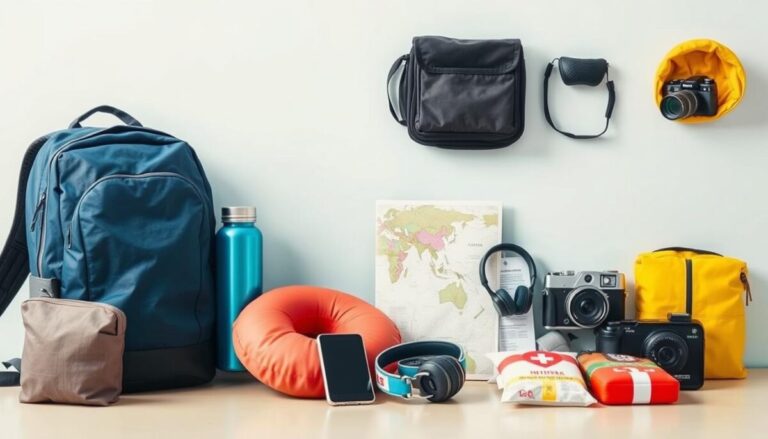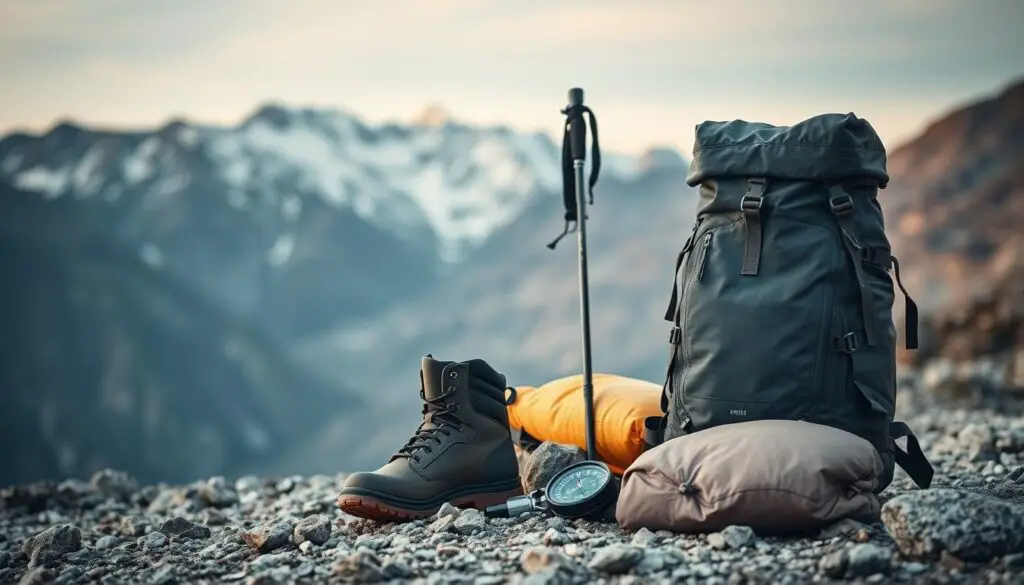
Are you ready for an adventure of a lifetime? Whether you’re a student or a digital nomad, backpacking lets you explore the world on your terms.
This travel guide is here to help you make the most of your journey. It covers planning your route, packing smart, and saving money. With the right tips, you can turn your travel dreams into reality.
Key Takeaways
- Learn how to plan your route for an epic adventure
- Discover the essentials for smart packing
- Find out how to save money while traveling
- Get tips on staying safe on the road
- Explore destinations perfect for digital nomads
The Backpacker’s Mindset: Preparing for Adventure
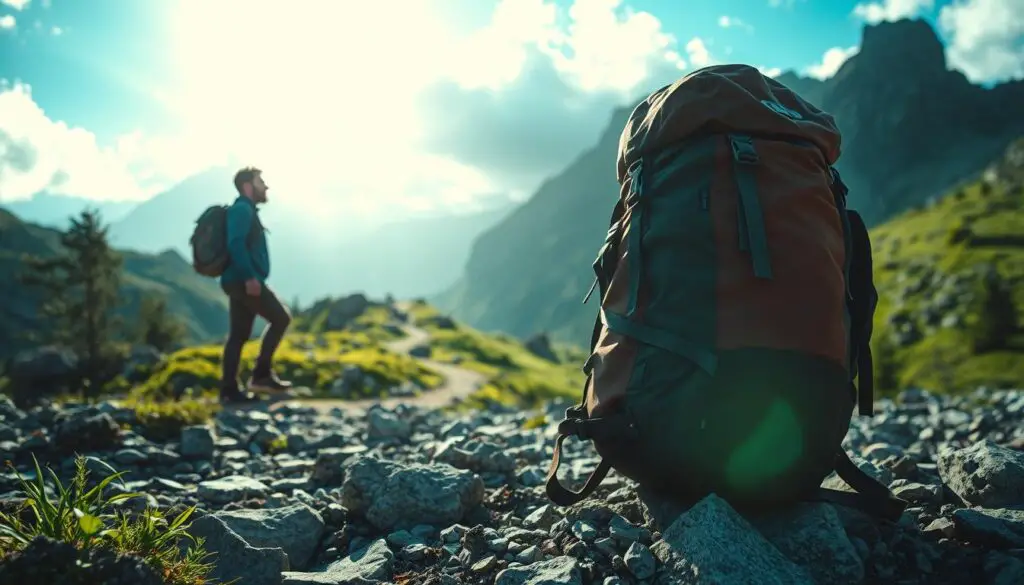
Before you start your backpacking trip, it’s important to understand the mental side of long-term travel. The right mindset can turn a good trip into a great one.
Mental Preparation for Long-Term Travel
Mental preparation is key for a successful backpacking trip. It means developing a positive attitude towards challenges. Build your resilience by embracing uncertainty and being open to new experiences.
As Henry David Thoreore said, “Go confidently in the direction of your dreams! Live the life you’ve imagined.” This quote shows the importance of mental preparation for backpacking.
Setting Realistic Expectations and Goals
Setting realistic expectations is key to avoid disappointment. Understand that things won’t always go as planned. Being flexible is important. When planning, set achievable goals that match your abilities and resources.
- Research your trekking routes and outdoor adventures thoroughly.
- Plan your itinerary according to your physical limitations and preferences.
- Prepare for contingencies by having backup plans.
Developing Adaptability and Resilience
Adaptability and resilience are key for backpackers. Being able to adapt to new places, cultures, and situations makes your trip better. As
“The greatest glory in living lies not in never falling, but in rising every time we fall.” – Nelson Mandela
To develop these traits, be open-minded and stay positive. Engage with local cultures, try new foods, and be ready to step out of your comfort zone.
Essential Backpacking Guides for Beginners
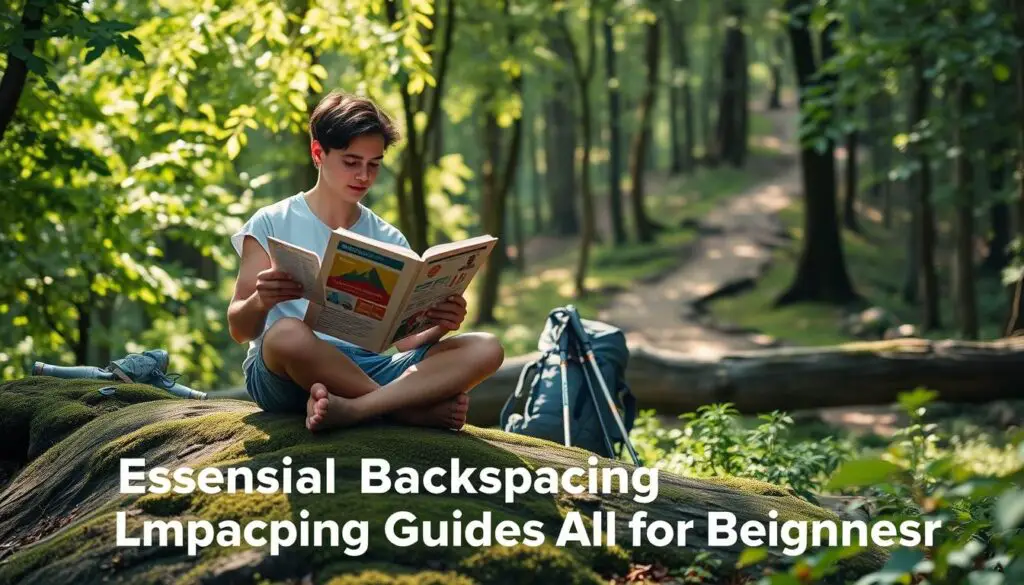
For beginners, knowing the basics is key to a great backpacking trip. It’s not just a way to travel; it’s a way to see new places while watching your wallet and the planet.
Understanding Different Types of Backpacking
There are many types of backpacking, each suited to different travelers. Ultralight backpacking means carrying less to move easier. Traditional backpacking is about carrying more for comfort. Knowing these types helps you plan better.
Planning Your First Backpacking Trip
Planning is essential for a good trip. Pick a place that fits your budget and interests. Think about how long you’ll be there, the weather, and what you want to do. Make a detailed plan and book your stay early to avoid stress.
- Research your destination thoroughly
- Plan your itinerary according to your interests and time
- Pack lightly but include essentials
- Stay informed about local customs and regulations
Resources and Communities for New Backpackers
For beginners, joining backpacking communities is super helpful. Online forums, social media, and blogs are full of tips on backpacking on a budget and student backpacking trips. They’re great for learning from others.
These groups offer advice on gear and navigating new places. They’re perfect for getting beginner backpacking tips or sharing your own stories. These resources make your backpacking adventures better.
Backpacking Gear Essentials for Students and Nomads
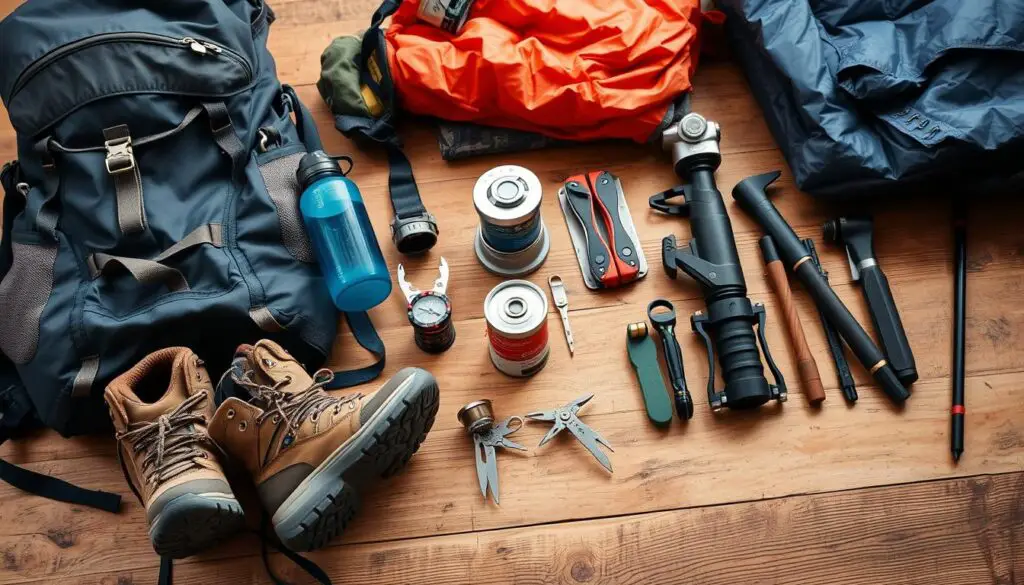
Whether you’re a student or a digital nomad, the right gear is key. It makes your travel better by adding comfort, productivity, and fun.
Choosing the Right Backpack
Your backpack is essential. Look for durability, comfort, and enough space. A backpack with many pockets helps you stay organized and access your stuff easily.
- Durability: A tough backpack can handle travel well. Choose nylon or polyester for strength.
- Comfort: Padded straps and a hip belt spread the weight. This lessens back strain.
- Capacity: Think about your trip length and what you’ll pack. A 30-40 liter backpack is usually enough.
Clothing and Footwear Recommendations
Choosing the right clothes and shoes is key for comfort and flexibility. Pick lightweight, quick-drying clothes that can be layered for different weather.
- Layering: Bring clothes that can be layered for changing temperatures.
- Footwear: Get a good pair of hiking boots or sturdy shoes for walking.
- Quick-Drying: Quick-drying clothes are vital for unexpected rain or sweat.
Tech Essentials for Digital Nomads
For digital nomads, tech is essential. Make sure you have the right gadgets to stay productive on the move.
- Portable Power Bank: A portable power bank is a must when you’re far from power.
- Noise-Cancelling Headphones: These help you focus in loud places like cafes or hostels.
- Universal Power Adapter: A universal adapter lets you charge your devices in foreign outlets.
Minimalist Packing Strategies
Packing light is a game-changer. It makes traveling easier and less tiring.
“The art of packing light is not just about fitting a lot into a small space; it’s about being intentional with what you bring and leaving behind what’s unnecessary.”
To pack light, focus on:
- Multi-Purpose Items: Choose items that do more than one thing.
- Packing Cubes: Use packing cubes to organize and compress your clothes for more space.
- Limiting Toiletries: Pack only the essentials and consider travel-sized toiletries.
Budget-Friendly Backpacking: Stretching Your Dollars
Backpacking on a budget is all about being creative. You can have an amazing time without spending a lot. As a student or nomad, finding ways to save money is key.
Accommodation Hacks for Budget Travelers
Finding cheap places to stay is a must for budget backpackers. Hostels are great because they’re affordable and you meet other travelers. Camping or using Couchsurfing are also good options.
- Book in advance to get the best prices.
- Choose hostels with free Wi-Fi and breakfast.
- Stay outside city centers for cheaper rates.
Eating Well on a Shoestring Budget
You don’t have to give up taste or health to eat on a budget. Street food is cheap and delicious. Buying snacks and ingredients at local markets helps too.
- Find out about local street food before you go.
- Buy fresh produce at markets.
- Avoid tourist spots for cheaper food.
Transportation Tips to Save Money
Transport can be expensive, but there are ways to cut costs. Use public transport, walk, or cycle. For longer trips, look into budget airlines or buses.
- Check out public transport before you arrive.
- Get a local transport card for savings.
- Look for student discounts on flights.
Working While Traveling: Opportunities for Students
Students can work while traveling to fund their trips. Look into remote jobs, teaching English, or seasonal work.
Key opportunities include:
- Remote freelance work or online tutoring.
- Teaching English in countries that need it.
- Seasonal jobs in tourism or farming.
Being smart and flexible lets you enjoy backpacking without spending too much. With the right approach, you can make your trip affordable and fulfilling.
Top Destinations for Student Backpackers and Digital Nomads
The world is full of exciting places for student backpackers and digital nomads. Some places stand out more than others. Whether you’re looking for a good deal, reliable internet, or unique experiences, there’s a place for you.
Best Budget-Friendly Countries
For student backpackers, saving money is key. Countries like Cambodia, Thailand, and Vietnam offer great culture at a low cost. You can enjoy tasty street food, stay in cheap places, and see historical sites without spending a lot.
Other places like Bolivia, Peru, and Hungary are also affordable. They mix city life with natural beauty. These countries are perfect for those on a tight budget.
Digital Nomad Hubs with Reliable Infrastructure
Digital nomads need reliable internet and infrastructure. Places like Chiang Mai in Thailand, Bali in Indonesia, and Lisbon in Portugal are great. They have fast internet, coworking spaces, and lively communities.
These spots offer a good work-life balance. You can stay productive and enjoy your surroundings. Many digital nomads also like the networking events and workshops available.
Off-the-Beaten-Path Destinations Worth Exploring
Exploring less crowded places can be rewarding. Countries like Georgia, North Macedonia, and Slovenia offer unique experiences and stunning views without the crowds.
These places give you a chance to truly experience local cultures and see untouched beauty.
Seasonal Considerations for Different Regions
When planning your trip, think about the weather and events in your destination. For example, South America is dry from May to September. This is a great time to visit Peru and Bolivia.
In contrast, Southeast Asia is warm all year. But, it’s best to avoid the rainy season from June to October. Knowing these patterns helps you plan a better trip.
Navigating Practical Matters: Visas, Banking, and Connectivity
Traveling as a student backpacker or digital nomad is more than just fun. You’ll need to handle practical things to make your trip smooth.
Understanding Visa Requirements and Student Travel Options
First, you must think about visa rules for your destinations. Countries have different rules for students and digital nomads. Some offer special visas for remote workers, while others need a tourist visa.
Students should also look into studying abroad options. Many countries have programs for international students. Make sure to check the requirements and deadlines for these programs.
Managing Finances Across Borders
Managing your money well is key for long-term travel. You need a banking solution that works worldwide. Look for a bank account with no foreign transaction fees and a widely accepted debit card.
Digital nomads and students might find online banking and mobile apps helpful. These tools make transactions easy across different currencies. It’s also smart to have some local currency when you arrive in a new place.
Staying Connected: Phone Plans and Internet Access
Staying in touch is important for digital nomads and students. Look into phone plans with international coverage or get a local SIM card. This can save you money.
For reliable internet, consider a portable Wi-Fi hotspot or co-working spaces. Many places for travelers offer Wi-Fi, but having a backup is wise.
Balancing Academic Responsibilities While Traveling
Students face a big challenge balancing school and travel. It’s key to plan a schedule that fits both. Many schools offer online courses, making it easier to study from anywhere.
Stay organized and keep up with your school work. This way, you can enjoy your travels without worrying about falling behind.
Health and Safety While Backpacking
A successful backpacking trip depends on keeping health and safety in mind. Before you start, think about important factors that will keep you safe and healthy.
Essential Health Precautions and Vaccinations
First, talk to a doctor about the vaccinations and medicines you need. Some places require special shots or pills, like for malaria or yellow fever.
Vaccination Recommendations:
- Hepatitis A and B
- Typhoid
- Rabies (if you’ll be around animals)
- Meningitis (for certain regions or during outbreaks)
Travel Insurance Options for Students and Long-term Travelers
Travel insurance is key for backpacking safety. Look for policies that cover medical emergencies, trip cancellations, and evacuations. Students and long-term travelers can find special plans that fit their needs.
| Insurance Provider | Coverage | Cost |
|---|---|---|
| Allianz | Medical, trip cancellation, evacuation | $50-$100/month |
| World Nomads | Medical, adventure activities, trip cancellation | $40-$90/month |
| AXA | Medical, trip cancellation, baggage loss | $30-$80/month |
Staying Safe in Unfamiliar Environments
Staying safe means being aware of your surroundings. Learn about the places you’ll visit, including local customs and safety tips.
Some general safety tips include:
- Be careful with your belongings, even in crowded places
- Avoid walking alone at night
- Keep your accommodation’s contact info with you
- Stay updated on local conditions through government advisories
Managing Medications and Health Needs on the Road
If you have health needs or take medicines, plan ahead. Bring enough of your medicines and talk to your doctor about traveling with your condition.
Tips for managing medications:
- Carry a copy of your prescription and a list of your medications
- Pack medicines in their original packaging
- Research local healthcare options at your destinations
Building Community: Connecting with Fellow Travelers
Backpacking lets you meet people who love to travel. Making friends on the road can make your trip better. You’ll share amazing experiences and create friendships that last a lifetime.
Hostels and Co-living Spaces
Hostels and co-living spaces are perfect for meeting travelers. They’re places where you can talk, share stories, and get tips. Many hostels have events to help guests meet and have fun.
Co-living spaces are great for digital nomads. They mix community living with workspaces. This way, you can work and meet people who like the same things as you.
Digital Platforms for Meeting Other Backpackers
Today, there are many ways to meet travelers online. Social media groups and travel forums are good places to start. They have lots of info and chances to meet others who travel or have similar interests.
Apps like Backpackr and Meetup help you find groups of travelers. They make it easy to meet people in person. These apps are great for building a community while traveling.
Balancing Solitude and Socialization
It’s important to mix socializing with alone time. Alone time helps you rest and think about your travels.
Finding the right balance is key for your mental health. You can journal, meditate, or take solo trips. Solitude can make your travel experience even better.
Creating a Portable Support System
Building a portable support system means having a network of people and resources. This includes friends, online groups, and local contacts.
Having a support system gives you peace of mind and help when you need it. It’s about being part of a community that gets the ups and downs of backpacking.
Conclusion: Embracing the Backpacking Lifestyle
Starting your backpacking journey opens a world of freedom and adventure. With the right mindset and preparation, you can face challenges and enjoy the rewards of long-term travel. Our guide has given you the key knowledge for the backpacking lifestyle, from mental prep to practical tips like gear, budget, and safety.
Embracing backpacking lets you dive into different cultures, meet new people, and learn valuable skills. It’s perfect for students wanting a break or digital nomads looking for new adventures. Take the first step, and you’ll start making unforgettable memories and forging your own path.
As you travel to new places and step out of your comfort zone, stay informed with good backpacking guides. Don’t hesitate to ask for tips from seasoned travelers. Long-term travel can be a life-changing experience, helping you grow, succeed academically, and understand the world better.
FAQ
What is the best way to prepare for long-term backpacking travel?
What are the essentials for backpacking gear?
How can I backpack on a budget?
What are the best destinations for student backpackers and digital nomads?
How do I navigate visa requirements and financial management while backpacking?
What health and safety precautions should I take while backpacking?
How can I connect with fellow travelers while backpacking?
What are some tips for planning my first backpacking trip?
How can digital nomads stay productive while traveling?
What are some strategies for managing stress and maintaining mental health while backpacking?
Frequently Asked Questions
- Q: What’s the most budget-friendly way to backpack as a student or nomad?
- A: Opt for hostel stays, couchsurfing, or work-exchange programs, and use budget airlines or regional buses to cut transportation costs.
Share :
You Might Also Like






